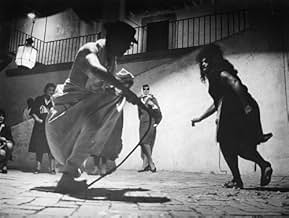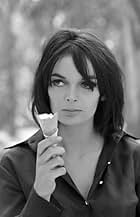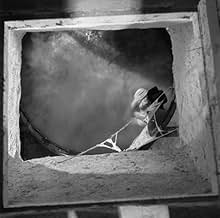Un director de cine acosado se retira con recuerdos y fantasías.Un director de cine acosado se retira con recuerdos y fantasías.Un director de cine acosado se retira con recuerdos y fantasías.
- Ganó 2 premios Óscar
- 19 premios ganados y 9 nominaciones en total
Anouk Aimée
- Luisa Anselmi
- (as Anouk Aimee)
Eddra Gale
- La Saraghina
- (as Edra Gale)
Argumento
¿Sabías que…?
- Trivia8½ (1963) was shot, like almost all Italian movies at the time, completely without sound recording on set. All dialogue was dubbed during post production. Federico Fellini was known for shouting direction at his actors during shooting, and for rewriting dialogue afterwards, making a lot of the dialogue in the movie appear out-of-sync. (Source: High-def Digest)
- ErroresWhen Guido visits the cardinal in the mud bath, the cardinal is sitting in a chair, fully dressed in his cassock, as two attendants use a sheet to form a curtain around him; however, as the camera cuts to a closer angle, the cardinal is suddenly undressed to the waist.
- Citas
Claudia: I don't understand. He meets a girl that can give him a new life and he pushes her away?
Guido: Because he no longer believes in it.
Claudia: Because he doesn't know how to love.
Guido: Because it isn't true that a woman can change a man.
Claudia: Because he doesn't know how to love.
Guido: And above all because I don't feel like telling another pile of lies.
Claudia: Because he doesn't know how to love.
- Versiones alternativasIn the American theatrical release version, Rodgers & Hart's "Blue Moon" can be heard twice: the first time, when it's played by strolling strings near the shopping plaza where Guido meets up with his wife, Luisa; the second time, when Guido goes out for a drive with the "real" Claudia. However, in the original Italian release, the song played in both scenes is "Sheik of Araby." The Criterion laserdisc features "Blue Moon," but it's "Sheik of Araby" on the DVD, possibly due to the use of different source materials.
- ConexionesEdited into Bellissimo: Immagini del cinema italiano (1985)
Opinión destacada
Intellectuals have written volumes on this strange film by Italian New Wave director, Federico Fellini. I am not an intellectual, so my review will be brief. At its most basic, "8 1/2" (a.k.a. "Otto e mezzo") concerns Guido, a film director (supposedly a surrogate for Fellini himself), who is having what amounts to a midlife crisis. Guido is frustrated in his film-making, and by his relations with other people in his life. But the film's story does not proceed in a traditional, linear fashion. Fellini more or less abandons logical narration, in favor of "open form" narration, wherein the story's causal chain of events is broken.
Thus, trying to figure out what is going on in this film can be hard. Guido's fantasies, memories, dreams, and reality co-mingle in a kind of cinematic stew. Fellini presents viewers with a kaleidoscope of surreal B&W images of ordinary objects and eccentric, chattering characters which interact with Guido and with each other, in ways that defy logic, and give breathtaking meaning to the term symbolism. Followers of psychologist Carl Jung would have a field day. In style, the film is flamboyant. In substance, the film is maddeningly subliminal. And yet, even the most metallic cynic, Pauline Kael notwithstanding, must surely appreciate the rareness of Fellini's probing introspection.
Given the bizarre, unstructured content of "8 1/2", I wonder about the issue of necessity. Suppose Fellini had added an extra ten minutes to the screenplay, or deleted ten minutes. Would that have made any difference? Apart from Guido, if this or that character had been deleted, how would that have changed the story's significance? And if, as some have suggested, the film is a mirror image of Fellini's own confused psyche, can the story be construed as an intuition of his future film-making?
"Otto e mezzo" is not for everyone. Like a Zen koan, "8 1/2" invites frustration. It is above all else a celebration of ambiguity and abstraction, a cinematic experience to ponder, especially on the heels of four or five martinis ... or 8 1/2, if you really want to induce immense intellectual insight. Cheers.
Thus, trying to figure out what is going on in this film can be hard. Guido's fantasies, memories, dreams, and reality co-mingle in a kind of cinematic stew. Fellini presents viewers with a kaleidoscope of surreal B&W images of ordinary objects and eccentric, chattering characters which interact with Guido and with each other, in ways that defy logic, and give breathtaking meaning to the term symbolism. Followers of psychologist Carl Jung would have a field day. In style, the film is flamboyant. In substance, the film is maddeningly subliminal. And yet, even the most metallic cynic, Pauline Kael notwithstanding, must surely appreciate the rareness of Fellini's probing introspection.
Given the bizarre, unstructured content of "8 1/2", I wonder about the issue of necessity. Suppose Fellini had added an extra ten minutes to the screenplay, or deleted ten minutes. Would that have made any difference? Apart from Guido, if this or that character had been deleted, how would that have changed the story's significance? And if, as some have suggested, the film is a mirror image of Fellini's own confused psyche, can the story be construed as an intuition of his future film-making?
"Otto e mezzo" is not for everyone. Like a Zen koan, "8 1/2" invites frustration. It is above all else a celebration of ambiguity and abstraction, a cinematic experience to ponder, especially on the heels of four or five martinis ... or 8 1/2, if you really want to induce immense intellectual insight. Cheers.
- Lechuguilla
- 5 feb 2005
- Enlace permanente
Selecciones populares
Inicia sesión para calificar y agrega a la lista de videos para obtener recomendaciones personalizadas
Detalles
- Fecha de lanzamiento
- Países de origen
- Sitios oficiales
- Idiomas
- También se conoce como
- Eight and a Half
- Locaciones de filmación
- Tivoli, Roma, Lacio, Italia(location)
- Productoras
- Ver más créditos de la compañía en IMDbPro
Taquilla
- Total en EE. UU. y Canadá
- USD 98,760
- Fin de semana de estreno en EE. UU. y Canadá
- USD 11,947
- 11 abr 1999
- Total a nivel mundial
- USD 200,502
- Tiempo de ejecución2 horas 18 minutos
- Color
- Mezcla de sonido
- Relación de aspecto
- 1.85 : 1
Contribuir a esta página
Sugiere una edición o agrega el contenido que falta


























